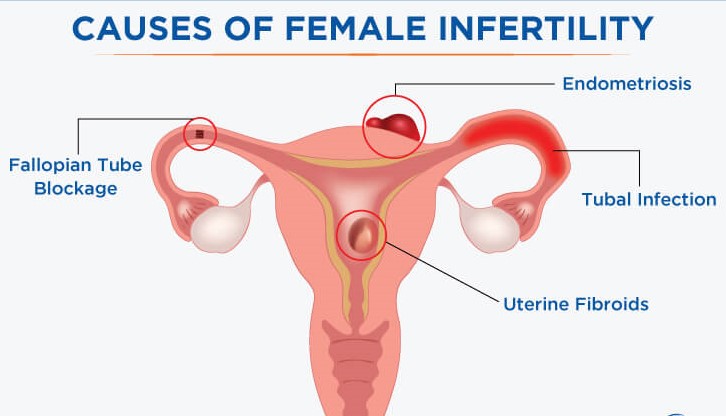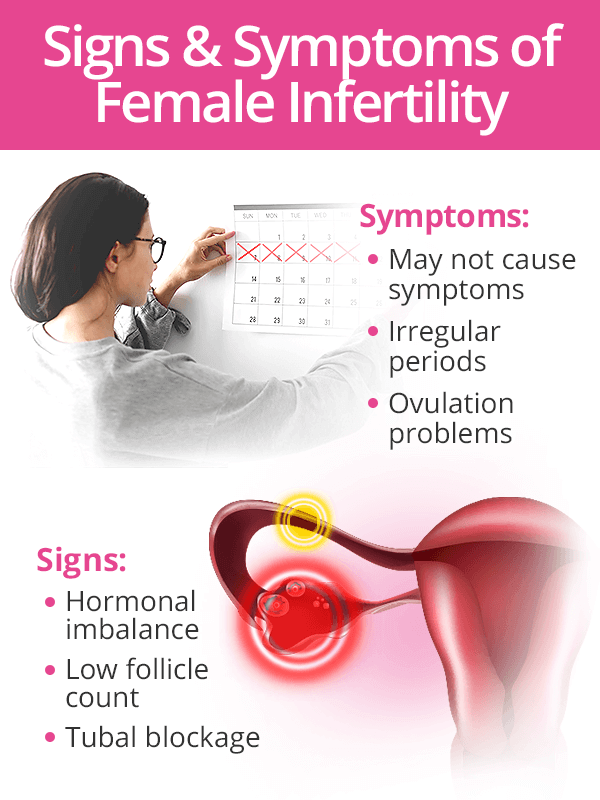Female Infertility

Female Infertility is the inability to conceive a baby by female even after unprotected intercourse for an year. As per statistics, among all the childless couples, female infertility accounts for one third of the cases.
There could be various causes for female infertility.
What are the Causes of Female Infertility?

The most common causes for female infertility are:
- Issues in reproductive organs, which could be in uterus, ovaries or fallopian tube or any other part
- Menstrual irregularities, which could arise from lifestyle issues or consumption of certain drugs
- PCOS: Poly cystic ovarian syndrome, in which multiple cysts are found in the ovaries
- Fibroids, the growth inside the uterus
- Endometriosis, this is the displaced lining of the uterus
- Infections
- Other diseases like Autoimmune or Thyroid disorders
- Raised level of hormone prolactin
- Blocked fallopian tubes, mostly due to pelvic infection
What are the Symptoms of Female Infertility?
It is not necessary that a female show any symptoms at all. But below are some issues that one must be looking for if they are trying to conceive for a long time and haven’t been successful
- Irregular menstruation cycle
- Obesity
- Pain in pelvic region
- Painful and heavy menstrual flow
- Excess hair growth especially on face

How is Female Infertility Diagnosed?
There are various methods to diagnose the issue. A manual pelvic examination could be required at the gynecologists. The doctor then further could suggest various other tests depending upon the symptoms
- Imaging tests like Sonography or Ultrasound
- Blood Tests, to find out hormone levels in blood
- Thyroid profile to test full hormonal functioning
- Urine test
- Ovulation test
Other tests like a laparoscopy, hysteroscopy could be required to check the uterus and other organs in details.
How is Female Infertility treated?
Infertility treatment depends on the cause. It may take a lot of time to show positive results. Patience and preference for the treatment is important in such cases.
Medication
In some cases of hormonal imbalances, endometriosis or even infections, medications are available to address the issue. The dosage and frequency is to be decided by the doctor and monitoring of the changes through physical and medical tests is done.
Surgery
To address certain issues, surgery might be needed. One such issue is fibroids. There could be various procedures for a surgery. Laparoscopy is one such technique. When and which surgery is needed depends upon the symptoms and diagnosis of the infertility condition.
Other methods
Other methods to address condition of infertility which can not be treated by surgery or medication, are also available. These are assisted medical procedures to artificially induce pregnancy by various techniques. The most popular of them is the IVF process.
Dealing with infertility
Infertility is not a disease but is rather a condition. Modern technology, experienced and knowledgeable doctors, well equipped infertility centres have made it possible to treat majority of infertility conditions. It is almost impossible now to remain childless if one is open to consider available options with an open mind.
Contact Dr Leena Patil (MBBS, MS – Obstetrics & Gynaecology) for infertility treatment options. Dr Leena Patil has over 10 years of experience in fields like Dysmenorrhea Treatment, Treatment of menstrual disorders, PCOD treatment, High-Risk Pregnancy Care, Infertility Evaluation / Treatment, Tubectomy/Tubal Ligation and Gynaec Problems and more.
